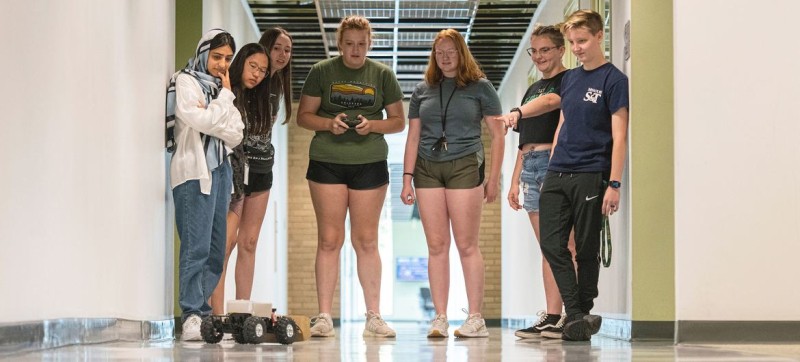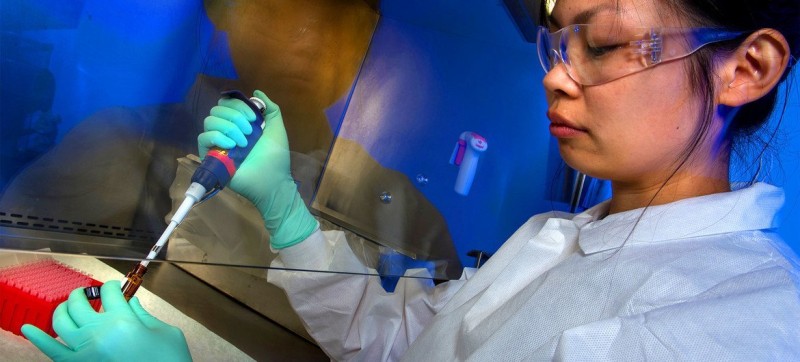
© Missouri S&T/Michael Pierce Students at Missouri University of Science and Technology in the United States test a robot they have designed together.
That’s the message from UN Secretary-General António Guterres on Friday, the International Day of Women and Girls in Science, who appealed for concrete action to increase their ranks.
Diversity and fresh perspectives
“On this International Day of Women and Girls in Science, we highlight a simple equation: More women and girls in science equals better science,” said Mr. Guterres.
Tweet URL
“Women and girls bring diversity to research, expand the pool of science professionals, and provide fresh perspectives to science and technology, benefiting everyone.”
Theoretically, science should be open to everyone, yet it is still overwhelmingly male.
Gender inequality and prejudice
Even though more girls are in school today than ever before, women and girls are underrepresented in STEM (science, technology, engineering, and mathematics) education, according to the UN Educational, Scientific and Cultural Organization (UNESCO).
Just one in three researchers is a woman, and women account for just 35 per cent of graduates in STEM-related fields.
Their numbers are even smaller in cutting edge fields such as Artificial Intelligence, where only one in five professionals is a woman.
“If these gender inequalities are so significant, it is because they are deeply rooted in our societies,” said Audrey Azoulay, the UNESCO Director-General, in her message for the Day.
“It is because of the persistence of gender stereotypes and prejudices, which sometimes persuade girls that scientific studies are not for them, despite their tremendous potential.”
Stereotypes start early
The low number of women working in science, or studying to enter the field, directly reflects the discrimination they face around the world, said Sima Bahous, head of UN Women, the agency championing gender equality.
This is even more true for marginalized women and girls, including indigenous and Afro-descendant women, women with disabilities, those living in rural areas or who identify as LGBTIQ+.
“It starts in their early years and is shaped and reinforced by gender stereotypes and norms,” said Ms. Bahous.
“These can be found embedded in curricula, textbooks, and teaching and learning practices. The choices imposed upon girls in school shape their careers and employment opportunities as adults.”
‘Paradigm shift’ needed
Changing the picture requires “a paradigm shift” and commitment towards acknowledging and eventually removing structural barriers, she added.
It must lead to educational reform, “with new curricula that fosters girls’ curiosity in scientific discoveries from an early age, including science and technology subjects through primary school.”
Or, as the UN chief bluntly put it: “We must – and we can – do more to promote women and girl scientists.”

CDC A scientist tests a sample suspected of containing a bacterial toxin.
Unleash the potential
The Secretary-General called for initiatives such as new scholarships, internships, and training schemes, but also quotas, incentives and mentorship programmes, to help women overcome entrenched hurdles and build their careers.
Crucially, he stressed the need to affirm women’s rights and break down stereotypes, biases, and structural barriers.
“We can all do our part to unleash our world’s enormous untapped talent – starting with filling classrooms, laboratories, and boardrooms with women scientists,” said Mr. Guterres.
Examples of excellence
UNESCO is among UN agencies working to encourage girls and women to study the sciences and has supported a mentorship programme in East Africa that so far has reached 11 million students, especially girls.
Since 1998, UNESCO and the L’Oréal Foundation have held an award ceremony to recognize exceptional women scientists from around the world.
More than 120 laureates have been honoured over this period, five of whom have also received the Nobel Prize.
“As role models, they are examples for young women to follow – underlining that they too can achieve excellence,” said Ms. Azoulay.
Several young scientists participated in an event at UN Headquarters in New York on Friday, focused on global progress towards bringing clean water and sanitation, renewable energy and sustainable industrialization to communities, while also making them safer and more inclusive.
Future innovators
The UN General Assembly President, Csaba Kőrösi referred to them as the future Nobel laureates and innovators who will be discovering solutions that can save the planet.
“You are the living proof of why it is so important that more women and girls are able to exercise their right to equal access to education,” he said.
Mr. Kőrösi wondered what would have been the impact if women’s access to STEM education had been the rule, rather than the exception, as their underrepresentation “puts a brake” on global efforts to achieve sustainable development.
“We need the expertise of women scientists to address challenges – from climate change and food insecurity to disease outbreak and water scarcity, just to name a few,” he said, adding that “given the challenges that we are facing, we cannot afford the luxury of not tapping into a larger pool of talent.”

